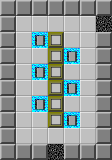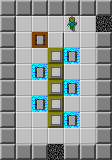Please create an account or Login! Have fun!
Mouse Panel Glitch
The Mouse Panel Glitch is a glitch in the MS ruleset of Chip's Challenge. It was first reported on November 29, 2002 by Anders Kaseorg. It has been used for speedrunning in three CCLP2 levels to date, with the first being Captured, where Kaseorg added 3 extra seconds. On the same day as that report, David Stolp also found it to be useful in Debug File. Since then, Madness II and Switch Hit have each had an extra second added to them, and it is possible to add .2 seconds to After the Rainstorm by using a slight variation. The Mouse Panel Glitch is not responsible for any additional seconds in CC1.
Explanation
The glitch applies when Chip is next to any block with any Chip-acting wall in the direction facing him: a thin wall must block Chip from moving onto the square, not the block from moving off. To use it, click the mouse on any square not on the same row or column which would result in Chip's next move being an attempt to enter the block's square. Assuming that the flick is a legal move, the flick will occur and Chip will move in the legal direction towards the clicked square, within one turn rather than two. If the flick is not a legal move, then a ram has been executed similarly.
Variations
If there are flickable or rammable blocks in both directions of the mouse click, then both blocks will get the treatment at the same time, using only one move rather than the two it would normally take. See Tyler Sontag's level 316, So Totally Extremely Unfair, for an example of how this variation works.
The second variation is referenced above, which allows the player to execute a ram using the glitch. Since this does not move the block, this variation is only useful when it is sliding on force floors or ice and it cannot move because the space in front of it is a block-acting wall. As just removing the obstacle will cause Chip to be flattened, Chip has to ram the block in order to remove the obstacle safely.
For solution use, this technique is not recommended because it makes it impossible for the click to be detected in a TWS recording. No "oof" sound occurs when this glitch is used unless it is of the first variation, since Chip actually attempts to move in the second direction. An AVI solution has no sound, but a mouse click can be seen; still, its exact effect may be unclear to some watchers.
Demonstration
The computer chip section of Debug File is shown above. The thin walls face R, L, R, L, R and L in forwards reading order. To get the blocks onto the water with the computer chips underneath, Chip must flick each block. If Chip clicks *D-L from [4, 2], although he has flippers, this would cause the chip to be erased. Chip must click specifically *U-L, such that this is the result on the following turn:
Tools for easier use
When using the mouse in any form, it will continue to carry Chip to the square clicked on until Chip runs into a wall. To avoid this, hit the keys firmly such that Chip's Challenge cannot read the mouse click beyond the time of its use.
An easy way to use the Mouse Panel Glitch in either MS or Tile World is to pull up a second game window in advance, pause the game when the glitch is ready to be used, and find a square Chip can click on by using the other window as a guide. Chip always stays in the center of the 9x9 visible grid unless that visible grid runs into the edge of the level, and a square 2R D from Chip in one window will remain 2R D from Chip as long as Chip stays at least four squares away from the border. After marking this square with his finger, the player can switch windows, move the cursor under the held finger, and the cursor will stand on the correct space.
This method was developed by Andrew Bennett to counteract the introduction of the MS pause screen into Tile World, which had not been seen in any previous Tile World versions and was added along with the programming that recreated the Mouse Panel Glitch.
Trivia
- The earliest occurrences of this glitch were when the tile blocking Chip was a thin wall on Chip's side of the block; although it can apply to anything that acts as a wall to Chip, the thin wall (or panel) is the best-known example and gives the glitch its name.
- In all cases where this glitch is usable, the Button Smash Glitch can apply, depending on several circumstances, if the square the block drops onto is a button.

